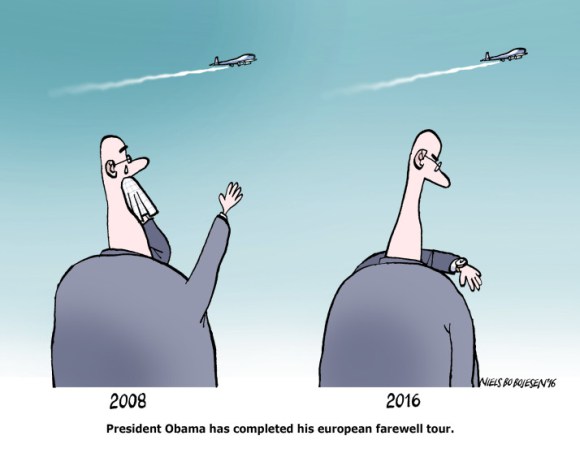Ouch! Here is the subtitle of the post excerpted below by Nahal Toosi: “In countries key to the president’s legacy, people express profound disappointment in a man from whom they expected great things.”
From the article:
[P]eace did not arrive in Obama’s time. Obama’s standing in much of the world seemed to sag each year as he struggled to fulfill his promises. America, after all, still has troops in Iraq and Afghanistan. In the Middle East, revolutionary movements, including ones Obama overtly backed, have largely fizzled or bred violent anarchy. And Russia has ignored Obama’s warnings and asserted its influence in former Soviet states, sometimes at the point of a gun. Many saw in this picture a naive president and a United States of diminished standing. In Jordan, confidence in Obama fell from 31 percent in 2009 to 14 percent last year, the Pew surveys show. Some 86 percent of Britons expressed confidence in Obama in 2009; in 2015, it was 76 percent. Even in Kenya, where Obama has family ties, confidence in him stood at 80 percent in 2015, down from the mid-90s his first two years. The numbers don’t suggest deep antipathy toward Obama, but the heady infatuation that accompanied his arrival in office has changed into pervasive disappointment.
In an effort to capture this evolving view of Obama’s historic presidency, last month, POLITICO, in collaboration with the BBC World Service, visited three countries critical to Obama’s foreign policy—Cuba, Egypt and Ukraine. A radio documentary of our interviews with dozens of citizens in those and other nations airs this weekend. In each country, we discovered a palpable sense of discontent with the now gray-haired American leader. Many Ukrainians believe Obama is too meek in the face-off with Russia over their country. Egyptians fighting for democracy and human rights feel abandoned by Obama, who has had to balance their shifting desires with the U.S. national interest. And Cubans, while grateful to Obama for his efforts to open up their communist system, express impatience that he has not done more to speed up their slow—very slow—march toward prosperity.
…
“I think people who were listening to him were naive,” [Egyptian Ahmed] Elsayed says. “A president is just one player in the scene, so a president’s word isn’t always a valid one. Even if he has true good intentions, that doesn’t mean that he would be able to bring them to reality.”
Read more: Politico.com

